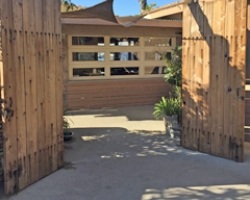The City Council recently approved a $26,000 contract with Rasic Construction to install a new Southern California Edison service connection to the city-owned restaurant building on First Street. (It used to house River’s End Cafe.) Although the size of the contract was less than the threshold amount that would require City Council approval, Public Works Director Steve Myrter said he thought the matter should be brought to the Nov. 13 council meeting because the same contractor had another agreement with the city for another project related to the restaurant space. According to his staff report to the council, Rasic completed an emergency water main repair for more than $9,700 and also won an informal bid to install a grease interceptor for $28,000.
The building at 15 First Street belongs to the city, but has been leased to new owners David Coe, real estate agent Rosie Ritchie and former O’Malley’s on Main owner Brian Kyle operating under the Bay City Limited Liability Company. In September 2018, Coe, the project manager for the LLC, told the City Council that construction of the new restaurant, which will be called the Beach House, would be completed in early 2019. However, until the city finishes upgrading the property it can’t be turned over to the new owners and the city doesn’t start receiving rent from the new tenants.
A Seal Beach resident expressed concern that the city was going to install a 600-amp service panel and said the cost should be passed on to the tenants.
The city’s agreement with Rasic was originally on the Consent Calendar and would have been approved without discussion, but District Four Councilwoman Schelly Sustarsic had it pulled from the calendar. In a pre-meeting email to staff, Sustarsic asked if a 200-amp panel would cost more. Myrter told the council that the existing conduit does not meet the current code. He said the existing Edison panel was past its useful life and argued that a 200-amp panel would be inadequate for a restaurant building. He said he had envisioned a 400-amp panel, but he also said that a 600-amp panel was a prudent investment for a city-owned building. Myrter told Sustarsic that a 200-amp panel was for residential buildings.
Myrter said the council had approved $180,000 for the project. He said the city had spent about $90,000 to $95,000. Myter said he expected the city would have saved money by the end of the project. Sustarsic moved to approve the agreement.




